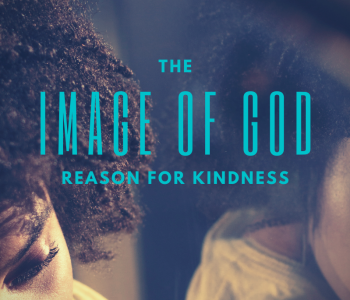 Post
Post
The image of God: reason for kindness
Hi everyone. It was the weekend – but not anymore. It all blurs into one at the moment. So following on from last week’s post on compassion and kindness – and in the light of heightened levels of anxiety, anger and frustration I think many of us have been experiencing in the last while – I have a question for myself and you too (if you like): why should we be kind to others?
The obvious answer (and I’m sure many of you were quick off the mark with this one – like a pastor’s kid in Sunday School) is because it is the righteous and loving thing to do: it’s what God would want from us, it’s His standard and His expectation and His demand. This is quite obviously correct. But there is another layer here that I think needs to be explored. We need to be kind to each other to a degree greater than we are called to be kind to animals or the environment, say. And I am, not for one moment, suggesting that we should be less kind to animals or the environment – on the contrary, I think these are areas that require a lot more improvement. All our actions and all our thoughts should be considered, gracious, compassionate and generous (not that any of us are quite – or even remotely – there, yet). This is the standard we should aim for, the higher calling, the prize we strive for. But when it comes to people, there is an inherent need to take it up a notch. Why is this?
It may be because there is something deeply and inherently valuable in humans – something that transcends mere notions of life and existence. Yes. The short answer is an easy one. We have been created, imbued, designed, intended and instilled with something which sets us far apart and above all other aspects of the universe we live in: the very image of God.
So God created human beings in his own image.
In the image of God he created them;
male and female he created them. (Genesis 1:27)
I cannot overstate how critically important this verse is in establishing a correct worldview for our relationships and interactions with one another. It elevates our significance and worth to the heavens: we carry something in our very beings which is more valuable than we could ever imagine. We all (every one of us) bear the image of the one God: the everlasting, all-powerful, omniscient God. This means that every human life, every person, is astonishingly precious.
Now, there is a fair bit of debate over what the ‘image’ of God is exactly. Is it His creativity, His authority, His capacity for independent reason and choice? It’s quite probably all these things and more. I don’t want to chase that rabbit right now. But whatever it is, it is remarkably and incomparably valuable and important.
This is a remarkably important concept. It gives us value and dignity – irrespective of our circumstances, ability, gender or ethnicity. It means that we can confidently believe that there is not another person on this planet that is more valuable than we are: we carry a rare treasure inside us. Human life is significant. I am significant. You are significant.
Moreover, this truth is the great leveler amongst us. It is of such significance and value that everything else about us is almost immaterial – and every one of us has it in equal measure! In the light of this one great attribute, the amount of money you have, or how many degrees you have, or how attractive you are, or how many employees you oversee pales into infinitesimal nothingness. The reply to every boast of human endeavour, success or popularity is easily and overpoweringly “but I too carry the very image of God.” We cannot allow ourselves to measure human value on anything else – this would be pettiness and would be ignoring the awesome truth: a truth that means that we are all equally and tremendously important and valuable.
This truth, then, demands that we treat ourselves and one another with the utmost respect, no matter who the ‘other’ may be. Indeed, this one truth is the singular and overwhelming rebuttal to any notion or idea that I can treat anyone poorly because they are different to me. It is the final and winning argument against slavery, racism, sexism and tribalism. It is why husbands should never treat their wives as anything less than equals and also why we should honour and care for the elderly and those that are less able. It is a powerful moderating concept to the man-made economic systems of which we are a part (think income inequality and the strata of success and power which some systems create, think of the way other systems strip individuals of their individual identity and value) and to the wide-spread rise in nationalism that we are seeing around the world. It urges us to help the immigrant, reach out to the poor, and work against systems of discrimination and oppression. It even demands that we take care in the way we treat prisoners or those that we feel have got themselves into a mess of their own accord.
Jesus went so far as to teach that we should in fact go out of our way to respond proactively to those that are most different to us. We need to actively counter our prejudices, choosing to be neighbours to those who we would naturally be least likely to connect with – ensuring that we respect them and honour them as co-bearers of the image of God. It was the Samaritan who chose to be a neighbour to the beaten Jewish man in Jesus’ parable (Luke 10:25-37). Samaritans had a different religion, were ethnically different and were despised. Who then should we go out of our way to be a neighbour to?
As we battle the challenges of this time – COVID-19 and the changes it has wrought, racial tensions, political tribalism, hyper-cynicism, fear of the unknown, economic depression, and so on – let us never forget that every human is intrinsically valuable beyond measure. Every life lost is a tragedy. Every moment of oppression or discrimination is an abomination. I know that I need this truth to shape my thoughts and attitude towards those around me. I know that I have to get to grips with the nuances of how this plays out in my circumstances. It is my choice. I hope that I have the courage to serve and honour others and afford them the dignity they deserve – as I know Jesus did.
I’d love to hear your thoughts on this.
‘til next weekend.
Phil
